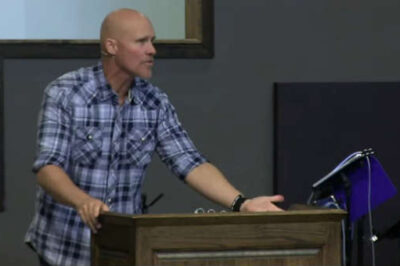Pastor Shane Idleman believes prophetic words do not carry the same authority as Scripture, and that those who exalt themselves with the title of “prophet” should humble themselves and, rather than boasting of their gifts, should recognize the “burden” of their responsibility. Idleman, who pastors Westside Christian Fellowship in Leona Valley, California, makes these points during a video clip from a recent sermon.
“New Testament prophets, did you know this, did not speak with authority equal to the words of Scripture,” Idleman says. “In Acts 21:4, we read, ‘They told Paul not to go to Jerusalem.’ … He disobeyed. He went to Jerusalem. Because see, it was a warning to him of what was going to happen but not to be put above Scripture that he should not go. Therefore prophecy has less authority than teaching.”
Idleman predicted he would receive criticism for those comments, and then criticized those who “self-exalt” themselves with lofty titles like “apostle” and “prophet.” He says humility is the key to the prophetic gift.
“All those guys out there with prophet on their business card are not going to like that statement,” Idleman says. “So if you’re listening, take prophet off your business card. Take apostle off your business card. Just be Jack Smith, and let people call you a prophet. Let people say he’s apostolic in his ministry. Don’t put these big titles on your business card. Every time I get an email, [saying] ‘I’m prophet such-and-such. I’d love to speak at your church’? Delete.”
Idleman says ultimately that prophetic gifts are important but are less reliable than the Word of God, because they are more subject to human interpretation or even error. He says the fruit of a true prophet is not their own self-confidence or self-appointed title, but whether their words consistently come true.
“Here’s what concerns me about prophecy,” Idleman says. “…I trust God but not me. I trust you but I don’t know. You might just be having good thoughts. ‘Shane, I believe you’re supposed to do this.’ That might just be an encouragement. How do I know it’s God? But we do have the lasting Word of God that is not changing, that is grounded and faithful on everything. So inner feelings and promptings are by their very nature subjective. If you get an inner sense or an inner feeling or an inner prompting, by their very nature they are subjective. How do you know it’s truly God? The Old Testament had a pretty hard test. You know what the test was? If what you said comes to pass, you’re a prophet. If not, we’re going to kill you. That’ll make you shut your mouth a lot quicker. That’s why you’d see a lot of the prophets in the Old Testament primarily saying ‘the burden of the Lord.’ … You can always tell a true spokesman for God is because what they say lines up with the heart of God: mercy and love and grace and judgment, holiness. The whole counsel of God’s Word. So one who exercises this gift must be careful, and we must repent if we miss it.”
Idleman’s comments were independently echoed on Twitter by Justin White, who pastors City Life Church’s campus in Suffolk, Virginia. White wrote, “I remember doing a study and being struck how again and again in Scripture prophets are either hesitant or downright upset at the call of God (see: Ezekiel) to play the role. When I see folks all but sprinting to their prophetic soapbox to shout things down… it tells me a lot.”
Watch the full sermon clip embedded here.







Leave a Comment
You must be logged in to post a comment.